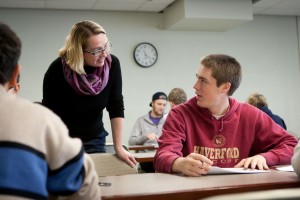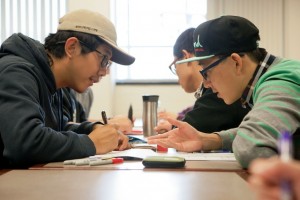Colton Bamford ’17 (Souderton, Pa.) came to Lafayette intending to major in physics. But after one semester of Engineering Science 101, he scrapped that plan.
“After a few classes I started to realize that mechanical engineering was everything I loved about physics and math,” he says.
Hands-on approach

Professor Jenn Rossmann discusses an assignment with Henry Scales ’17.
Intro to Engineering is a hands-on, laboratory-based seminar designed to increase students’ understanding of the connections among mathematics, science, and a broad array of engineered systems. Students are introduced to engineering studies and mechanical, chemical, environmental, and electrical and computer engineering with group projects like those they could see in the workforce.
“This was an amazing class,” says Luis Espinal ’17 (New York, N.Y.). “I got a lot of experience working in teams on very different tasks. We were pushed to work collaboratively to achieve a goal. That gave me a strong sense of what the world will be like when I leave Lafayette.”
The course covers concepts, methods, and skills that will be relevant no matter what field the students decide to major in. It is taught in two seven-week modules to give students different views of engineering methods and applications.
Human-centered design
Jenn Rossmann, associate professor of mechanical engineering, teaches a module focused on “design thinking,” an approach to engineering design that is human-centered, based on developing empathy with the people an engineer wants to help.
“They learn to consider all possible stakeholders in a design process and that engineers need to seek out and identify situations in which their design and analytical skills can be of service to society,” says Rossmann. “They learn how engineering analysis, prototyping, and testing contribute to this design process as an engineer evaluates alternatives and improves the design.”

Zijia Zhu ’17, left, and Ruikun Sun ’17 work their way through a problem during Intro to Engineering.
One example is when students reverse engineer a common device and figure out the function of each part. They need to consider the objectives that guided its design, the tradeoffs that were made, and ways it might be improved.
“Knowledge can make you an engineer, but only passion can make you love doing it,” says Bamford. “We focused on what being an engineer meant, and the responsibility that we would have by working to better the world for future generations.”
Social implications
Ismail Jouny, Dana Professor of Electrical and Computer Engineering, developed and taught two modules last fall: one on the MATLAB computing environment and another on secure digital communications. He hopes students come away with more knowledge of engineering work ethic, planning, safety, and deadlines, but also stresses a better understanding of the social implications of design.
“Because of this class I realized what I valued from engineering was the way of thinking, the thought process in problem solving. I do not see myself in an engineering team trying to solve problems, but I see myself in a social activist group using engineering methodology to bring about social change and impact the community in a positive way,” Espinal says.
Other modules last fall:
- Micro and nanotechnology (James Ferri, chemical and biomolecular engineering)
- Extreme building (Anne Raich, civil and environmental engineering)
- Making biofuels using algae (Lindsay Soh, chemical and biomolecular engineering)

